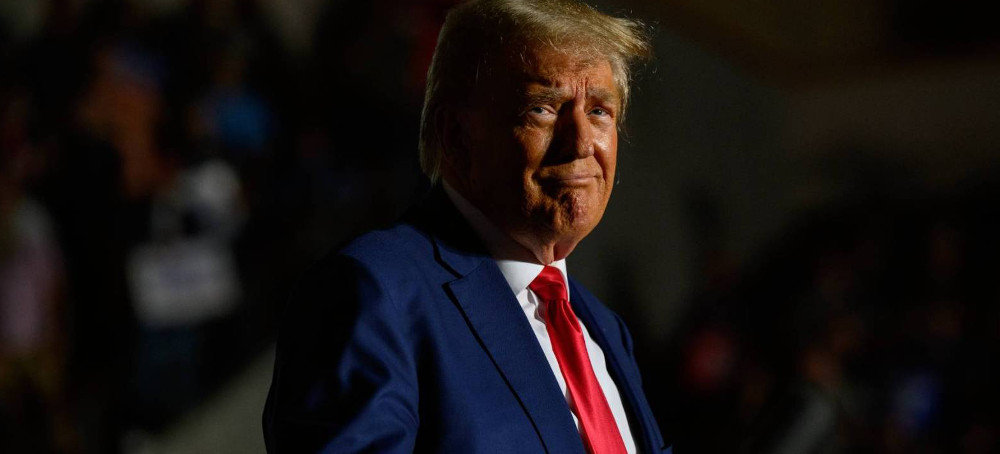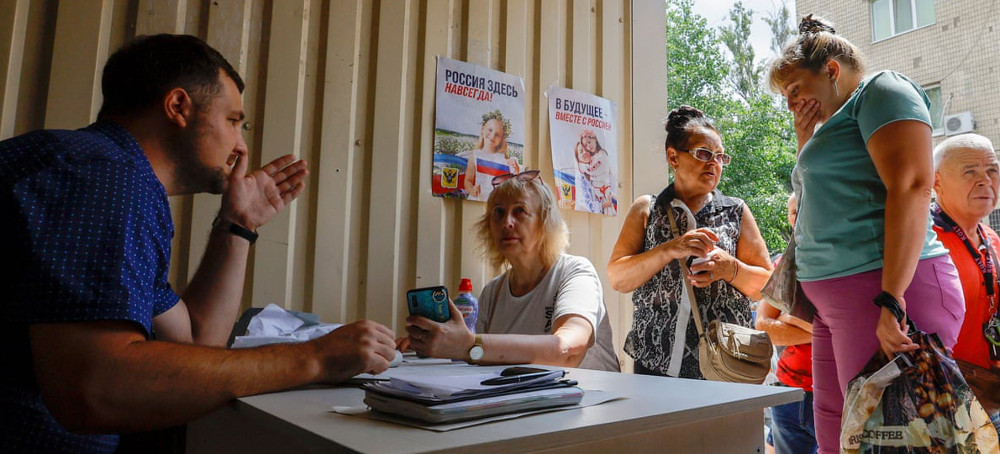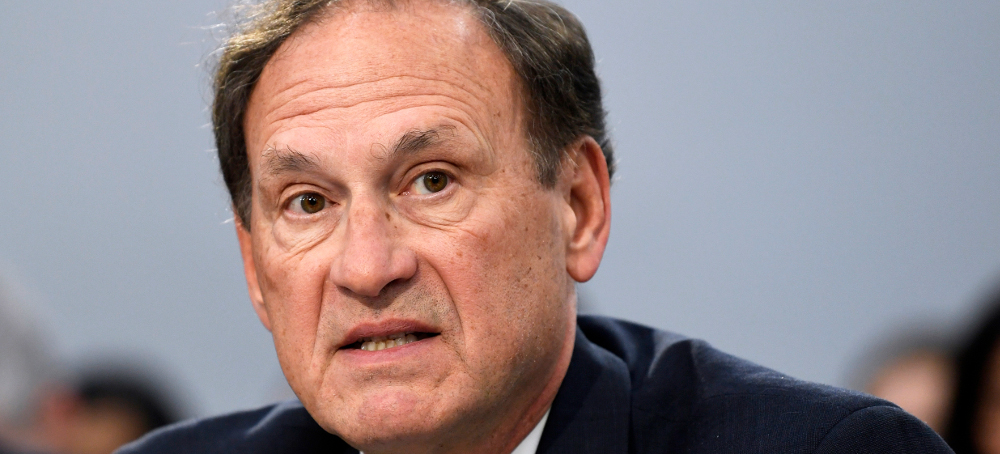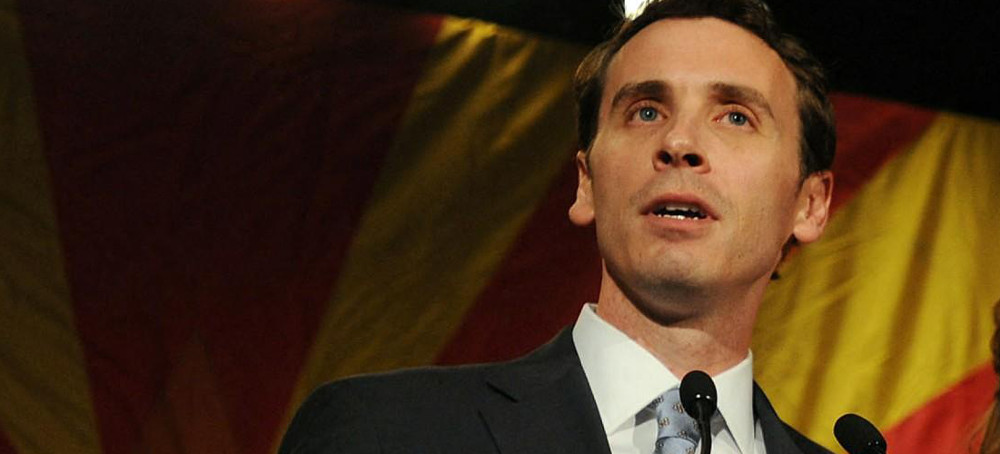Live on the homepage now!
Reader Supported News
The article below is satire. Andy Borowitz is an American comedian and New York Times-bestselling author who satirizes the news for his column, "The Borowitz Report."
“Jack So-Called Smith and the Biden Justice Department want to put Your Favorite President Behind Bars!” the appeal, which was sent to millions of Trump supporters, reads. “For a Limited Time Only, You Can Go in My Place!!!”
According to a campaign spokesman, Trump donors are lining up in substantial numbers to serve time in prison for him. “This offer is doing even better than the Trump N.F.T.s,” the campaign worker said.
The success of the appeal, however, has raised concern that the demand for Trump prison slots could overwhelm supply. “Hopefully, there will be some more indictments soon,” the spokesman said.
READ MORE  Donald Trump enters Erie Insurance Arena for a political rally while campaigning for the GOP nomination in the 2024 election on July 29, 2023, in Erie, Pennsylvania. (photo: Jeff Swensen/Getty)
Donald Trump enters Erie Insurance Arena for a political rally while campaigning for the GOP nomination in the 2024 election on July 29, 2023, in Erie, Pennsylvania. (photo: Jeff Swensen/Getty)
Repeatedly explaining on national TV that your client orchestrated a criminal plot might not be the best legal strategy
He is definitely still doing that, though. John Lauro, one of the lawyers by Trump’s side as he pleaded not guilty on Thursday, has been particularly active in front of the camera. He tried to claim Tuesday on CNN that the case was merely a First Amendment issue before arguing there’s nothing wrong with submitting an alternate slate of electors. He then went on Fox News after the arraignment, where he went ahead and admitted Trump directed the scheme to hold up the Electoral College certification.
“Ultimately, what President Trump said is: Let’s go with Option D. Let’s just pause the voting and allow the state legislature to take one last look and to make a determination as to whether the elections were handled fairly. That’s just constitutional law. That’s not an issue of criminal activity.”
Lauro said the same thing on Newsmax later on Thursday. “He asked Mr. Pence to pause the voting for 10 days, allow the state legislatures to weigh in, and then they could make a determination to audit or reaudit or recertify,” he said. Lauro defended Trump by arguing that he didn’t call to “send in the tanks.”
Unfortunately for Trump, what Lauro is describing here is, in fact, illegal. John Eastman, who masterminded the plan for Mike Pence to halt the counting of the Electoral College, even admitted it.
“At 11:44 p.m., Co-Conspirator 2 emailed the Vice President’s Counsel advocating that the Vice President violate the law and seek further delay of the certification,” the indictment reads, with “Co-Conspirator 2” referring to Eastman. “Co-Conspirator 2 wrote, ‘I implore you to consider one more relatively minor violation [of the ECA] and adjourn for 10 days to allow the legislatures to finish their investigations, as well as to allow a full forensic audit of the massive amount of illegal activity that has occurred here.”
Trump’s team is also sure to argue that the former president truly believed he won the election, despite the indictment laying out how several people around him — people who wanted him to win the election — explained to him that he lost. Alina Habba, another Trump lawyer, went ahead and confirmed to the press on Thursday that “everybody was made aware that he lost the election.”
Trump’s lawyers may be giving Fox News viewers a way to justify their belief that Trump did nothing wrong, but Special Counsel Jack Smith isn’t just going to throw his hands up and drop the case. Regardless of what his supporters think, Trump will face accountability for working to overturn the election — that is, unless he wins in 2024 and installs a more sympathetic Justice Department.
READ MORE  Local residents gather to submit documents and apply to become Russian citizens in the then-occupied city of Kherson, Ukraine, in July 2022. One of the posters reads: 'Russia is here forever.' (photo: Alexander Ermochenko/Reuters)
Local residents gather to submit documents and apply to become Russian citizens in the then-occupied city of Kherson, Ukraine, in July 2022. One of the posters reads: 'Russia is here forever.' (photo: Alexander Ermochenko/Reuters)
Ukrainians in occupied territories who refuse Russian passports face threats, intimidation and possible detention or deportation, Yale study says
Yale University researchers found that residents of the Luhansk, Donetsk, Kherson and Zaporizhzhia regions were being targeted by a systematic effort to strip them of Ukrainian identity.
Ukrainians who do not seek Russian citizenship “are subjected to threats, intimidation, restrictions on humanitarian aid and basic necessities, and possible detention or deportation, all designed to force them to become Russian citizens,” the report said.
Russia’s actions were “classic war crimes in the sense that they are restricting or limiting through this process people’s ability to access critical services and resources that Russia is required to allow all people to access, such as healthcare, and humanitarian systems,” Nathaniel Raymond, the executive director of Yale School of Public Health, told CNN.
Moscow claims to have given Russian passports to more than 3 million Ukrainians since 2014, after the annexation of Crimea and occupation of Ukrainian territories since the launch of its full-scale invasion in 2022.
Russian prime minister Mikhail Mishustin said in May that Moscow had given passports to almost 1.5 million people living in parts of Ukraine’s Donetsk, Luhansk, Zaporizhzhia and Kherson regions seized since October last year.
“This number has grown since then, with leaders of the so-called Luhansk People’s Republic (LPR) claiming that three-quarters of residents of that oblast [region] had received Russian citizenship,” the report said.
Russian president Vladimir Putin has signed a series of decrees to compel Ukrainians to get Russian passports, in violation of international humanitarian law, the report said.
The report included a timeline of increasingly aggressive measures to pressure or force Ukrainians to become Russian citizens, starting in May 2014, when Russia illegally annexed Crimea. The timeline continues ahead to July 2024, when, according to new Russian laws, residents without Russian citizenship would be considered “foreigners” or “stateless” and can be detained in detention facilities and/or deported to Russia.
- March 2014: Russia illegally annexes Crimea and passportisation begins. Nine months after annexation, Russia claims that over 1.5 million people in Crimea have received Russian citizenship.
- February 2022: Russia’s full-scale invasion begins and Moscow captures parts of Kherson and Zaporizhzhia regions. Three months later, citizenship application in Kherson and Zaporizhzhia is simplified. This follows the simplification of citizenship applications in Donetsk and Luhansk in 2019. In September 2022. Russia illegally annexes Luhansk, Donetsk, Zaporizhzhia and Kherson.
- 18 March 2023: Russia introduces a law on unilateral renunciation of Ukrainian citizenship introduced. The policy allows residents to “renounce” their Ukrainian citizenship unilaterally. Two days later, Putin calls for passportisation to be accelerated and local occupation authorities quickly announce new passporting offices and mobile teams.
- 27 April 2023: Russia adopts a law that will allow authorities to detain or deport residents without Russian passports. Starting July 2024, residents without Russian citizenship will be considered “foreigners” or “stateless”.
- 6 June 2023: Destruction of the Kakhovka dam, resulting in widespread flooding and displacement. Russia’s forces use the aftermath to push citizenship on residents. Russian passport holders are made eligible for compensation for the flood damage, whereas Ukrainian passport holders are eligible only for only a small flat payment.
- 26 June 2023: Planning begins for deportation and detention facilities. The head of the so-called “Donetsk People’s Republic” announces a planning group to study facilities for detaining residents without Russian passports for deportation.
- 1 July 2024: Ukrainian residents who have not accepted Russian citizenship can be detained and/or deported, including to remote areas of Russia.
The report said: “While states are afforded wide discretion under international law with regards to conferring nationality, customary international law clearly forbids the imposition of citizenship without consent or under duress.”
The report was released as part of the Conflict Observatory program, with the support of the US state department and conducted by research partner the Yale School of Public Health’s Humanitarian Research Lab.
READ MORE  Supreme Court Justice Samuel Alito testifies before the House Appropriations Committee on Capitol Hill in 2019. (photo: Susan Walsh/AP)
Supreme Court Justice Samuel Alito testifies before the House Appropriations Committee on Capitol Hill in 2019. (photo: Susan Walsh/AP)
When Justice Samuel Alito was securing his place on the Supreme Court, he promised to adhere to ethics laws from Congress. But after failing to comply with anti-corruption laws, Alito is now insisting lawmakers have no authority to regulate the court.
But when Alito and most of his colleagues were trying to secure their confirmations to the high court, they promised the Senate Judiciary Committee they would adhere to ethics laws from Congress that regulate justices’ acceptance and disclosure of gifts, limit their outside employment income, and mandate recusal in some circumstances.
If Alito or any of the other justices had argued during their confirmation processes that Congress can’t regulate the Supreme Court, or that justices are not obligated to obey ethics laws, they may not have been approved by the Senate.
As ProPublica has reported, at least two current Supreme Court justices — Alito and Clarence Thomas — have apparently failed to comply with a federal gift law that Alito pledged to follow.
“They certainly said in their [Senate Judiciary questionnaires] that they would follow those laws,” University of Virginia law professor and judicial ethics expert Amanda Frost told the Lever. “They did not say anything about Congress’s authority to regulate them, frankly because it is obvious that Congress has that authority. Alito seems to be taking a new position from what he took before Congress [during] his confirmation.”
The Supreme Court did not respond to a request for comment.
It is illegal to lie to Congress. After the Supreme Court overturned Roe v. Wade last year, ending federal abortion protections, some congressional Democrats raised the prospect of impeaching the conservative justices who misled lawmakers during the confirmation process about their views on key precedents.
In June, ProPublica reported that Alito accepted a flight on billionaire Paul Singer’s private jet before the Supreme Court ruled on a business matter involving Singer’s hedge fund — a decision that proved lucrative for his firm. Alito failed to disclose the private jet trip, in apparent violation of long-standing federal ethics rules.
Alito claimed in a Wall Street Journal editorial that he had not recused from the case involving Singer’s hedge fund because “I was unaware of his connection with any of the listed entities, and I had no good reason to be aware of that,” even though Singer’s role in the court battle was widely reported.
The Alito revelation followed a series of reports about Thomas accepting undisclosed luxury gifts from Republican megadonor Harlan Crow, as well as news that conservative activist and Supreme Court architect Leonard Leo steered secret consulting payments to Thomas’s wife. The wave of investigative reports have fueled calls for Congress to impose a formal code of ethics upon the Supreme Court.
While justices are already bound by several federal ethics laws and voluntarily comply with the code of conduct for lower court judges, the high court does not have its own ethics code. The justices have reportedly been considering instituting a new ethics code themselves, but they have been unable to reach a unanimous agreement.
On Thursday, in response to questions about congressional efforts to require the Supreme Court to adopt a code of ethics, Justice Elena Kagan reportedly told an audience at the 9th Circuit Judicial Conference in Oregon, “Of course Congress can regulate various aspects of what the Supreme Court does.”
“If it comes back with something, we’ll have the chance to say something about it,” she added.
“Something We Have All Thought About”
Now that Democrats in Congress are weighing Supreme Court ethics legislation, Alito and two of the court’s wealthy benefactors, Crow and Leo, have started arguing that Congress cannot impose ethics laws on the Supreme Court.
“I know this is a controversial view, but I’m willing to say it,” Alito recently told the Wall Street Journal. “No provision in the Constitution gives them the authority to regulate the Supreme Court — period.”
Asked whether his colleagues agree, Alito said, “I don’t know that any of my colleagues have spoken about it publicly, so I don’t think I should say. But I think it is something we have all thought about.”
Eight current Supreme Court justices — including Alito — explicitly promised senators during their confirmation processes that they would follow ethics statutes passed by Congress in 1948 and 1989, according to records reviewed by the Lever.
The 1948 law mandated Supreme Court justices recuse themselves “in any proceeding in which [their] impartiality might reasonably be questioned,” while the Ethics Reform Act of 1989 added regulations on justices’ acceptance and disclosure of gifts and set limits on their outside employment income.
The justices additionally pledged to follow the Code of Conduct for United States Judges, which also regulates gifts, even though that code does not apply to the Supreme Court.
Responding to the Senate Judiciary Committee’s questionnaire in 2005, Alito wrote: “If confirmed, in matters involving recusal I would seek to follow the Code of Conduct for United States Judges (although it is not formally binding on justices of the Supreme Court of the United States), the Ethics Reform Act of 1989, 28 U.S.C. § 455, and any other relevant guidelines.”
Chief Justice John Roberts similarly wrote in his 2005 questionnaire: “If confirmed, I would resolve any conflict of interest by looking to the letter and spirit of the Code of Conduct for United States Judges (although it is not formally binding on members of the Supreme Court of the United States), the Ethics Reform Act of 1989, 28 U.S.C. § 455, and any other relevant prescriptions.”
Justices Kagan, Sonia Sotomayor, Neil Gorsuch, Brett Kavanaugh, Amy Coney Barrett, and Ketanji Brown Jackson all made similar pledges in their own Senate Judiciary Committee questionnaires.
“For the last thirty years, as far as the records I’ve been able to find, the justices have been writing the same boilerplate language in their Senate Judiciary questionnaires, which to me is an indictment against the seriousness with which they take their ethical responsibilities,” said Gabe Roth, executive director of Fix the Court.
He continued: “You’re going on the Supreme Court — you’re basically untouchable, nobody is going to be impeached and removed — and the idea that you’re not going to do more than just copy and paste the previous nominees’ boilerplate answers on ethics really isn’t a good look. It does not instill confidence in the ethical capabilities of the members of the court.”
The only justice who offered different ethics answers during his confirmation process was Thomas, who was nominated much earlier.
Thomas wrote in his 1991 confirmation questionnaire that he would follow the Code of Conduct for United States Judges, adding: “In case of conflicts of interest, I will either refuse or divest, as needed.”
“So Wrong as to Be Laughable”
Ethics experts reject the idea that Congress cannot regulate the court.
“The idea that the Supreme Court is beyond all powers of Congress to regulate is so wrong as to be laughable,” said Frost. “Which makes me think Alito has a different agenda — perhaps to give support to the people in Congress who don’t want the ethics legislation.”
Yale University law and history professor Samuel Moyn said during a recent Lever Live event that Congress “absolutely” can impose ethics rules on the Supreme Court, adding that “Congress can do what it wants.”
Alito is not the first justice to publicly question whether Congress can impose ethics rules on the Supreme Court. Roberts previously did so in a memo in 2011, when lawmakers were considering an effort to improve ethics at the high court.
“Congress has directed justices and judges to comply with both financial reporting requirements and limitations on the receipt of gifts and outside earned income,” wrote Roberts. “The court has never addressed whether Congress may impose those requirements on the Supreme Court. The justices nevertheless comply with those provisions.”
He added, “As in the case of financial reporting and gift requirements, the limits of Congress’s power to require recusal have never been tested.”
Frost noted that Congress has placed many regulations on the high court.
“Without Congress’s legislation regulating the court, we wouldn’t know what size the court is, we wouldn’t know where it should meet, we wouldn’t know which cases it should hear,” she said, adding that Congress writes the oath of office for justices, “which of course is intended to ensure that the justices behave ethically.”
READ MORE  We need everybody. (photo: David L. Ryan/The Boston Globe)
We need everybody. (photo: David L. Ryan/The Boston Globe)
Unions don’t organize enough people. Their structure is the problem.
1. The single greatest crisis facing unions is the long term decline in union density. Once upon a time, one in three American workers was a union member. Now it’s one in ten. That figure has been steadily going down for decades. If we don’t make it start going up again, organized labor is on a slow path to death.
2. Unions are more popular today than they have been since 1965. There are tens of millions of Americans who like unions, and who would like to have a union, but who are not union members. We also happen to have a pro-union president and a labor-friendly NLRB. The opportunity for new union organizing right now is historically strong.
3. The only way to take advantage of this opportunity to organize millions of new union members is… to do the organizing. The number of new unions that spontaneously organize themselves is very small. To raise union density, there must be many, many more union organizers out there organizing, translating the grassroots enthusiasm into actual new unions.
4. The existing institutions that are responsible for flooding the streets with all of those new union organizers are unions. They are not doing it. Nor have they been doing it for decades. We know this not only by the fact that they are not spending adequate money on organizing, but, more directly, by the fact that union density keeps going down. The numbers are proof.
Why is it that unions, the only things that exist to do new union organizing, do not organize enough new union members? Unions will tell you that there are many reasons — hostile labor laws, corporate union-busting, difficult political climates. There is some truth to all of these explanations, but they are also a bit like stopping and sitting down while a wild dog is chasing you, because running is tiring. Sure it is, but that’s not much consolation when you’re dead. There always have been, and always will be, political and corporate forces hostile to unions. That does not change the fact that unions must find a way to organize, or else die.
Apart from the shifting social and political and economic conditions of the world, there is an inherent structural reason why unions do not organize enough. It is this: Unions are supported by dues money paid by current members. The overwhelming internal political incentive of any union’s leadership is to serve the needs of current members. (And indeed they must!) But this ensures that new organizing — which is to say, spending the dues money of current members on work that benefits people who are not members — will always lack a natural internal political constituency inside of unions, other than the minority of people who are ideologically motivated by a belief in the labor movement.
This is just the union version of the dynamic that is familiar from every local government: People want their tax money spent in ways that benefit them. It’s a form of selfishness, but the sort of natural low-level selfishness that is a part of human nature. In unions, this tendency manifests itself by underspending on new organizing. The current members always have needs, and their needs get prioritized. The result has been a half century of declining union density, with the vast majority of people having no union to protect them.
This general situation is familiar to generations of union radicals who have tried and (usually) failed to harangue unions into organizing the masses. Continuing to struggle against these built-in structural barriers is not the best use of our precious time. Today’s favorable conditions for new organizing won’t last. Instead, what we need is a new structure that can make new organizing happen without being held back by the internal politics of unions.
The bulk of new union organizing, therefore, needs to be moved out of unions and into its own dedicated thing. We need a new institution that does a single task: New organizing. An institution staffed by organizers whose single job is to help non-union workers unionize their workplaces. A new organizing center that only does new organizing.
When the workers have won their unions, they can be placed into existing unions that can do the contracts and grievances and enforcement and all of the other normal union stuff. But new organizing—the job on which the future of the entire labor movement depends — is too important to be relegated to an afterthought within unions that are focused on catering to current members. We need to build something new that does not have any mixed incentives. Its success can be judged entirely on the number of people it unionizes.
This sort of national organizing center would require a lot of funding. The obvious place for it would be inside of an existing national labor group like the AFL-CIO. And in fact the AFL-CIO last year created the “Center for Transformational Organizing” (CTO) funded by a dues increase on member unions, that is supposed to do, you know, transformational organizing. The structure of this is promising, but the reality of it is not.
The CTO has existed for a year, and has not done any transformational organizing. In light of the urgency of the task, its $11 million could have been spent in an afternoon: Pick five or six existing unions that are actually doing organizing, and divide the money between them, to increase their organizing. (I can give you a list! Call me!) If the CTO is not going to do this, they should be deeply immersed in big organizing campaigns of their own already. The lack of results so far is not inspiring.
Another model that already exists is the Emergency Workplace Organizing Center (EWOC), a joint project of the Democratic Socialists of America and the United Electrical, Radio and Machine Workers of America. It is essentially a volunteer-driven coalition of organizers that will help anyone who contacts them start the organizing process. EWOC has the spirit that we need, but not the scale. In terms of resources, EWOC is a tent set up in the backyard, when what we need is a skyscraper.
Imagine a new organization that combines the everyone-in ideological commitment of EWOC with the structural advantages of the CTO. If existing unions directed much of their current organizing budgets into one big pot, the funding for such an organization would be significant. It could hire an army of organizers. It could scale nationally. It could target industries aggressively, and it could promote an EWOC-like open door that would help any worker anywhere start the organizing process. Most importantly, it would not suffer from the mixed incentives that have historically restrained unions from doing enough organizing. It would do numbers, or it would be a failure. Simple.
Most of today’s unions are already failing, but since union leaders are not being judged on the metric of new organizing, their jobs are secure, and they can keep on failing in peace. With a dedicated organizing center, that would not be the case.
Once you create this new organization, fund it, staff it, and give it independence, it can also seek out new funding streams on its own. Its annual budget would need to be big. But considering the fact that our job is to organize the work forces of companies that are worth billions or trillions of dollars, we should not be staggered by big numbers. It is money well spent.
Organizing is hard work. It will be hard whether we do an inadequate, ad hoc job of it, as we are now, or whether we do it systematically and wisely, as I am proposing. What we know is this: We must do a lot more new organizing, and our current system for doing so doesn’t work. Time to try something different.
If we, the American labor movement, continue to fail, we will have no one to blame but our own laziness and obstinacy. The people who suffer for our sins will be all the workers who need a union, but will never get one, because we never got around to helping them.
READ MORE  Ben Quayle addresses crowd during Arizona Republican Party election night event in Phoenix, Arizona, 2 November 2010. (photo: AFP)
Ben Quayle addresses crowd during Arizona Republican Party election night event in Phoenix, Arizona, 2 November 2010. (photo: AFP)
Dawn is urging the US Department of Justice to investigate ex-congressman Ben Quayle and his lobbying firm over its ties to LIV Golf
According to the report, released Thursday, Quayle is potentially downplaying Saudi Arabia's human rights violations while reportedly lobbying for LIV Golf, which is financed by Riyad's Public Investment Fund.
Quayle is the son of the 44th US vice president, Dan Quayle.
The report also suggests that Ben and his lobbying firm, Hobart Hallaway … Quayle Ventures (HHQ), might have breached US regulations by not registering lobbying activities for LIV Golf with the US Department of Justice, as required for representatives of a foreign government.
"Ben Quayle and his partners at HHQ have chosen to contribute to and benefit from the Saudi government's gross human rights abuses by lobbying for the Saudi Public Investment Fund- owned LIV Golf," Sarah Leah Whitson, Dawn’s executive director said.
"They have misled Congress, the Biden administration, and the American public by not acknowledging the foreign interests they serve and reporting on their activities benefiting those foreign interests, as required by law."
Ben has utilised his former status as a US public official and his lobbying firm to advocate for the interests of Saudi-owned LIV Golf in the US, Dawn said in its report.
He has been accused of omitting essential details concerning Saudi Arabia's abuses and helped to “sportswash Saudi Arabia’s human rights record”, the report said.
Dawn is calling on Ben and HHQ to terminate their agreement with LIV Golf, thoroughly assess all their clients, and discontinue representing clients such as LIV Golf.
Dawn is also calling on the US Department of Justice to thoroughly investigate HHQ's apparent violations.
"In this complex world of global politics and business, transparency and accountability are vital. Our democracy depends on our ability to understand who is influencing our policymakers and their true motives," Raed Jarrar, Dawn’s advocacy director, said.
"Ben Quayle and HHQ's lobbying activities on behalf of Saudi-owned LIV Golf not only undermine these democratic tenets but also provide a smokescreen for the Saudi government's severe human rights violations. This case is not just about lobbying or golf - it is about preserving the sanctity of our democracy."
Human rights violations
In June, the US Justice Department notified the PGA Tour that it will review the US golf operator’s planned merger with LIV Golf for antitrust concerns. The deal prompted calls from some US lawmakers for the Department of Justice to probe the deal, citing concerns over Saudi Arabia’s human rights record and competition in the game of golf.
“The PGA-LIV deal would make a US organisation complicit - and force American golfers and their fans to join this complicity - in the Saudi regime’s latest attempt to sanitize its abuses by pouring funds into major sports leagues,” the letter stated.
In 2018, Jamal Khashoggi, a critic of Saudi Arabia and columnist for the Washington Post and Middle East Eye, was killed by Saudi agents after entering the kingdom's embassy in Istanbul.
It was an assassination that American intelligence services believe was approved by Crown Prince Mohammed bin Salman, though he denies a role in the killing.
In 2021, the Human Rights Measurement Initiative (HRMI) released its annual tracker, which said that Saudi Arabia is one of the most disempowering and unsafe countries from state abuse.
This was a result of a poor record of torture, executions, extrajudicial killings, disappearances, arbitrary arrests, and the death penalty. HRMI noted that immigrants and people without a legal identity were at particular risk of having their economic and social rights violated in Saudi Arabia.
READ MORE  A black plume rises over East Palestine, Ohio, in February. Residents say there's a sense of being left on their own. (photo: Gene J. Puskar/AP)
A black plume rises over East Palestine, Ohio, in February. Residents say there's a sense of being left on their own. (photo: Gene J. Puskar/AP)
Federal and state officials say the air, water and soil is safe – but locals in Ohio town are still suffering damaging symptoms
In the months since, as the media and world have largely moved, their lives have not improved much. Kenner’s four-year-old son, who had asthma before the wreck, saw his symptoms become uncontrollable, forcing the doctor to change his medication, Kenner said. She and her eight-year-old son developed asthma, and they all have experienced nausea, diarrhea and headaches that they attribute to chemical exposure.
State and federal officials have told the Kenners the water, air and soil is safe, and their health issues have other sources. But the family, which lives several miles south of the accident site, is skeptical and still “relies on the kindness of strangers” who donate bottled water because they suspect their well is contaminated.
“It’s an ongoing nightmare,” Kenner said during a Thursday symposium to mark six months since the wreck and spill.
The Kenners are representative of the plight for many in the East Palestine region who say they still suffer symptoms stemming from chemical exposure. Independent university researchers have found 80% of residents they surveyed say new symptoms experienced since the wreck – headaches, rash, coughs, eye irritation, diarrhea – are still present, and about 40% said they suffer from post traumatic stress disorder.
Residents there say state and federal officials have downplayed residents’ concerns and potential health threats, and sometimes offer contradicting information. That has generated deep mistrust, and residents say there’s a sense of being left on their own.
“It feels like an apocalyptic movie … and we are living in it,” said East Palestine resident Misti Allison. The town feels like it was a “soundbite” and there is dismay over the perception that the situation is resolved, she said.
“[People] think it happened, it’s terrible, but it’s done with. But that’s not true,” Allison added.
About 50 out of 141 cars on the Norfolk Southern train derailed and exploded in a towering fireball over the town of 4,700 at the edge of the Appalachian hills. The fire burned near tankers carrying vinyl chloride, and, two days later, officials, fearing a “major explosion”, conducted a controlled burn of vinyl chloride as a prevention measure. The state and federal government’s response was largely viewed as inadequate, and it became the subject of national scrutiny and criticism.
Among other issues, the “controlled burn” likely released dioxin, PAHs and other chemicals that present long-term health threats. The EPA has said the level of dioxins in and around the town is safe, but a Guardian analysis by experts in February found the soil contains dioxin levels hundreds of times greater than the exposure threshold above which Environmental Protection Agency (EPA) scientists in 2010 found poses cancer risks.
The EPA has done some testing for dioxin in the area’s soil and has said it did not find elevated results. But that has been contradicted by independent research that found levels thousands of times above background levels.
The EPA has not checked residents for the chemicals, but independent researchers who tested blood samples say results should be back soon. A new program is also being developed by university researchers to check residents for butyl acrylate and vinyl chloride, and provide them with wristbands that can measure a range of toxic chemicals in the environment.
The findings will “direct the next steps we’re taking,” said University of Kentucky researcher Erin Hayes, who has helped organize the program.
Meanwhile, Purdue University researcher Andrew Welton presented evidence that the handheld devices Norfolk Southern’s contractors used to check homes for chemicals were incapable of finding them. His evidence included Norfolk Southern test results that showed no chemical detections in a home where independent testing found high levels. Even though Norfolk Southern’s contractors said they did not find chemicals, they noted they had to leave the home because of the overpowering chemical odor.
“The testing done on those buildings wasn’t designed to find the contamination that could cause the illnesses,” Welton said.
The EPA recently proposed a building decontamination program, but it does not include HVAC cleaning, indoor air testing and other measures, Welton said. He called on the agency to develop a more robust, systematic approach.
Residents who spoke at Thursday’s symposium say legitimate indoor testing is a priority, and officials’ refusal to do it is partly behind the mistrust. So is their denial that health issues stem from the wreck. Those ailments experienced by her family and others in the area flare when there is digging around the derailment site, Kenner said.
Residents say the officials have told them rashes, headaches and vertigo are not from chemical exposures, but are “stress symptoms”.
“Our health has been diminished,” Allison said “We’ve been told the soil is fine, the air is fine, the water is fine, but when you do your own research … it’s absolutely terrifying.”
The definition of “safe” is very subjective, Kenner noted. Officials have been using federal chemical exposure standards developed for worker safety, which is calculated off of eight hours of exposure for a man. But that does not mean the 24 hour exposures for elderly people, children and immunocompromised people are safe, Kenner added.
In a vacuum of reliable official information and a climate of distrust, concerned residents have been organizing and supporting one another, and have created an advocacy group called the East Palestine Unity Council.
“Nobody has reached out to me, nobody is making sure I’m OK,” said East Palestine resident Zsuzsa Gyenes, except neighbors and those who are a part of the council. At the same time, differences in opinion among residents over whether the town is safe have created divisions, which is “heartbreaking”, Gyenes added.
The federal government has taken few meaningful steps to avoid another catastrophe, and East Palestine residents offered advice for the next city that faces a similar catastrophe. “You need to be your own advocate,” Allison said.
Follow us on facebook and twitter!
PO Box 2043 / Citrus Heights, CA 95611



No comments:
Post a Comment
Note: Only a member of this blog may post a comment.